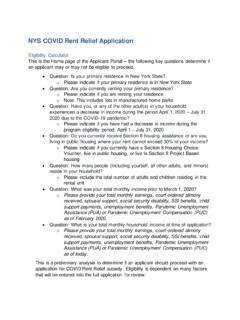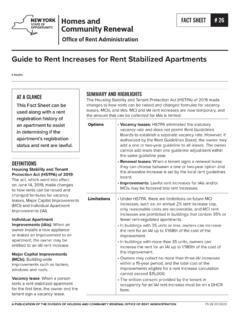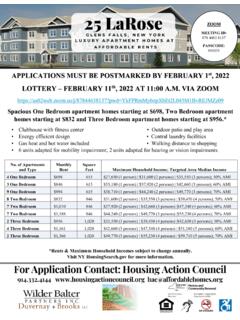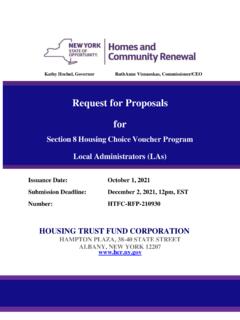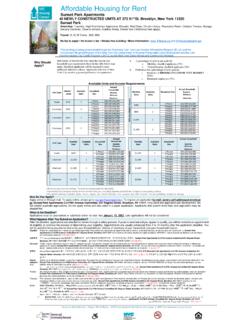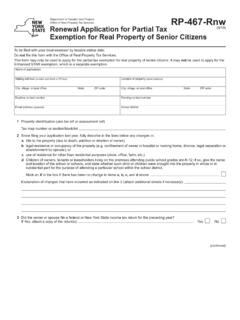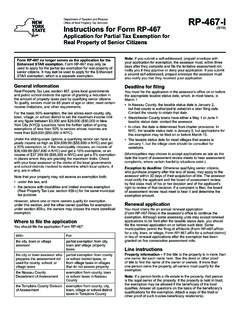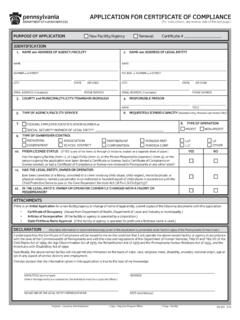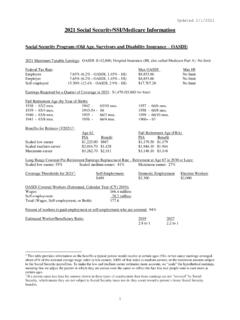Transcription of Major Capital Improvements (MCI) - Homes and Community …
1 9 PAGES# 24 FACT SHEETA PUBLICATION OF THE DIVISION OF HOUSING AND Community renewal OFFICE OF RENT ADMINISTRATION FS-24 (10/2019) Major Capital Improvements (MCI)AT A GLANCEThis Fact Sheet describes owners rights and responsibilities when raising rent after upgrading a building that s subject to rent-stabilization or rent-control of Housing and Community renewal (DHCR): DHCR is the New York State agency that invests in communities, preserves and protects affordable housing and enforces the state s rent control and rent stabilization Capital Improvements (MCIs): Building-wide Improvements such as boilers, windows and AND HIGHLIGHTSMCIs are building-wide Improvements to systems such as boilers, windows, electrical rewiring, plumbing and roofs.
2 Unnecessary cosmetic Improvements or work done in individual apartments that is not otherwise an improvement to the entire building are not eligible for To be eligible for a rent increase, the MCI must be a new installation and not a repair to old equipment. Any claimed MCI cost must be supported by adequate Tenants have 60 days to respond to the owner s MCI application. MCI increases are prohibited for buildings with 35% or fewer rent regulated units. MCI increases are prohibited if there are hazardous violations on file with the local municipality in addition to immediately hazardous violations. MCI increases, which were previously capped at either 6% or 15%, are now capped at 2% per year, and can only be collected once DHCR issues a written order granting a rent increase.
3 MCI increases may be granted based upon reasonable costs. Buildings with 35 or fewer units are amortized over 12 years, buildings with more than 35 units are amortized over 12 1 2 years. MCI increases are effective and collectible on the first day of the first month following 60 days from the mailing date of the order. MCI increases are temporary and must be removed from the rent 30 years after the date the increase became effective inclusive of any increases granted by the local rent guidelines PUBLICATION OF THE DIVISION OF HOUSING AND Community renewal OFFICE OF RENT ADMINISTRATION FS-24 (10/2019)FACT SHEET #24: Major Capital Improvements (MCI)PAGE 2 OF 9 FACT SHEET #24: IN DETAILD efinitionsWhen owners make Improvements or installations to a building subject to the rent stabilization or rent control laws, they can apply to the Division of Housing and Community renewal (DHCR) for approval to raise the rents of the tenants.
4 When the improvement or installation meets certain requirements it will be considered a Major Capital Improvement (MCI). To qualify as an MCI, the improvement or installation must: 1. be depreciable pursuant to the Internal Revenue Code, other than for ordinary repairs; 2. be essential for the preservation, energy efficiency, functionality or infrastructure of the entire building; 3. directly or indirectly benefit all tenants; and, 4. meet the requirements set forth in the useful life schedule contained in the applicable Rent Regulations. Some examples of MCI items include boilers, windows, electrical rewiring, plumbing and roofs. Unnecessary cosmetic Improvements or work done in individual apartments that is not otherwise an improvement to the entire building are not eligible for MCIs.
5 DHCR may grant a rent increase based upon the actual, verified and reasonable cost of the improvement and installation. To be eligible for a rent increase, the MCI must be a new installation and not a repair to old equipment. Some procedures qualify as MCI s as well, such as pointing a building. DHCR Fact Sheet # 33 Useful Life Schedule includes a partial list of installations that qualify for MCI rent adjustments. All applications for MCI rent adjustments must be filed within two years of the installation. Application and Documentation An owner must file an OWNER S APPLICATION FOR RENT INCREASE BASED ON Major Capital Improvements (DHCR form RA-79) available from DHCR Borough Rent Offices or from the main office at Gertz Plaza, 92-31 Union Hall Street, Jamaica, NY 11433, or from the DHCR website.
6 Small building owners are encouraged to contact the DHCR s SBO Unit for technical assistance prior to filing the application. All owners and the managing agent in cooperative/condominium corporations need to carefully review the MCI Instructions (RA-79 Instructions) while completing the application (RA-79) as they are more detailed than this Fact Sheet, which contains general completed application must contain: 1. an itemized list of the work performed and a description or explanation of the reason or purpose of such work; 2. certifications provided by the owner and contractors regarding the cost of the work and dates the work started and ended; 3. proof of payment; 4.
7 Copies of all necessary approvals from applicable government agencies for the work done; 5. an affirmation that the building is free of any hazardous or immediately hazardous violations with the applicable local municipalities;6. a list of tenants with their respective rent-regulated status. Case Processing 1. When an owner submits an MCI application, DHCR notifies the tenants and gives them an opportunity to submit written responses to the application. They are instructed to comment on the subject installation(s) as specifically as possible. Tenants can request A PUBLICATION OF THE DIVISION OF HOUSING AND Community renewal OFFICE OF RENT ADMINISTRATION FS-24 (10/2019)FACT SHEET #24: Major Capital Improvements (MCI)PAGE 3 OF 9an extension of time to respond to the application.
8 2. The owner may keep a copy of the application with all supporting documentation on the premises so that tenants may examine it. However, a complete copy of the MCI application with all the supporting documentation will always be available at the DHCR for tenant review upon written request. DHCR will review the application, consider the tenant responses and may request additional documentation if deemed necessary. 3. When processing is complete, DHCR will issue an order either granting a rent increase for the total amount requested, a partial amount, or denying the request. The owner and the tenants will be notified by DHCR of the amount of the rent increase per room along with the total amount that is applicable to each apartment in addition to the related terms and conditions in a written order.
9 Municipal Approvals and Tenant Responses 1. If the installation received the required approval from another government agency, tenant responses will be considered but may not result in a denial of the application. In such instances, the tenants may be referred to the other government agency for appropriate action. Examples: In New York City, installations of boilers, plumbing and rewiring require Department of Buildings approval. 2. If the installation did not require approval from another government agency, the owner can respond to the tenant complaints by submitting an affidavit by an independent licensed architect or engineer that the installation is free of any defects.
10 The tenants can rebut the affidavit by submitting a statement by at least 51% of those that originally complained, that the installation is still defective or they can submit a counter affidavit by a licensed architect or engineer. The affidavit must contain the original signature and professional stamp of the architect or engineer, not a copy. DHCR will consider the statement by at least 51% of the original complainants or the tenants counter affidavit in deciding to approve or deny the MCI application. DHCR may conduct an inspection to help it reach its decision. Example: Installation of windows, roofs and lobby doors do not require approval from other government Keeping and Proof of Payment In order to speed processing, owners are strongly urged to pay for all MCI costs by check.
